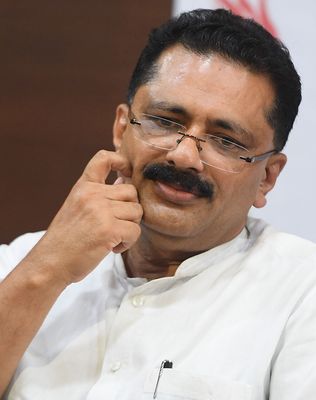He is the “face of the left front” in Kerala’s Malappuram district, and the “face of Muslims” in the ruling left front. He is K.T. Jaleel, who till recently was minister for higher education and minority welfare, and the CPI(M)’s personal-cum-political bridge into the Muslim heartland. But with corruption charges having forced him to step down, he has fallen from grace.
On April 9, the lokayukta in Kerala held Jaleel guilty of nepotism and abuse of power. The verdict came on a complaint that alleged that Jaleel had unlawfully appointed a close relative as general manager at the state-run Minorities Finance Development Corporation (MFDC). As pressure mounted on him to resign, Jaleel moved Kerala High Court to obtain a stay on the lokayukta’s verdict. But on April 13, even as the court was considering his plea, he announced that he was stepping down as minister. “The anti-left coalition in the state can kill me; but they cannot defeat me,” he posted on social media after announcing his decision.
The incident related to the complaint happened barely two months after the CPI(M)-led Left Democratic Front came to power in 2016. On July 28 that year, Jaleel wrote to the general administration department recommending that the eligibility criteria for the post of general manager at MFDC be revised to suit his relative’s educational qualification. The department replied that the criteria were fixed by the finance ministry after cabinet approval, and that any change would require cabinet nod. Jaleel, however, insisted that only the chief minister’s approval was needed as the specifics of the criteria were being expanded only and not necessarily changed. The chief minister’s office agreed with Jaleel’s contention and sanctioned his recommendation. The decision enabled the appointment of Jaleel’s cousin K.T. Adeeb, who had been an employee of a private-sector bank, as general manager “on deputation” at MFDC.
But Adeeb was soon forced to resign after his appointment sparked a political row. Jaleel had since been denying allegations of wrongdoing. “It is a case that has already been dismissed by the High Court,” he said after the lokayukta verdict. “The governor, too, had refused to entertain the complaint as there was no merit in it.”
But even as Jaleel filed a petition in the High Court against the lokayukta verdict, the opposition hit the streets demanding his resignation. “Jaleel has no moral right to continue,” said opposition leader Ramesh Chennithala. “Whenever the lokayukta has passed similar orders, the ministers concerned have resigned. That is the precedent.”
The state government, however, soon took up cudgels on Jaleel’s behalf. “This was not an appointment but a deputation, and the said official was already drawing a higher salary [from the private-sector bank],” said Law Minister A.K. Balan. “Also, there is no rule that says that one cannot be appointed on deputation if he or she is the cousin of a minister.”
V. Muraleedharan, BJP leader and Union minister, said Chief Minister Pinarayi Vijayan should have asked Jaleel to step down the day the lokayukta passed the order. “Why is Jaleel getting preferential treatment that even CPI(M) ministers had not received?” he asked, referring to a similar situation in October 2016, when charges of nepotism forced party veteran E.P. Jayarajan to step down as minister. “It is as if Jaleel is the supreme Polit Bureau member of the CPI(M).”
So, what makes Jaleel so uniquely powerful? The answer is that he entered the left front as a ‘giant killer’. In the 2006 assembly polls, he defeated P.K. Kunhalikutty, the tallest leader of the Indian Union Muslim League in Kerala, in the party’s bastion in Malappuram. Before he locked horns with Kunhalikutty and quit the IUML, Jaleel had been an up-and-coming leader of the IUML’s youth body. He had entered politics through the Students’ Islamic Movement of India, an organisation that was later banned by the Union government.
As an independent legislator, Jaleel was an ideal find for the CPI(M), which had been struggling to find a foothold in Muslim-dominated constituencies in northern Kerala. As an intellectual who holds a PhD in history, Jaleel, too, was happy to join hands with the CPI(M). His oratorial skills and dynamism energised the party cadre in Malappuram district, which had for long been an IUML bastion.
As he helped the CPI(M) make inroads in Malappuram, Jaleel increasingly became a powerful figure in the left coalition. In 2016, the coalition swept the assembly polls and Jaleel won from Thavanur, a constituency in the IUML heartland. He was the only independent MLA to be appointed minister in the Pinarayi Vijayan government.
In the past five years, Jaleel has faced a slew of allegations. He was alleged to have been involved in the gold smuggling case, which had led to the arrest of the chief minister’s principal secretary last year. He was also questioned by the customs department after it was alleged that he had helped unlawfully import “250 cartons of the Quran into the state” using the diplomatic route.
Officials in the ministry say Jaleel does not care two hoots for procedures. “If he thinks something needs to be done, then he just takes a decision unilaterally,” said a senior IAS officer who worked under Jaleel. “We have had a hard time with him.”
Even as the CPI(M) leadership has been vigorously defending Jaleel, veteran party leaders have aired their disapproval. “Jaleel still has not come to terms with the LDF’s style of functioning,” senior CPI(M) leader told THE WEEK. “Like most IUML leaders in the [Congress-led] United Democratic Front, he gives scant regard for procedures. All that is okay within the IUML. But the public will not tolerate any such things from an LDF government. Jaleel is yet to realise that.”


